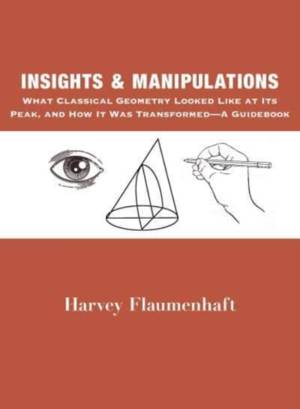
Wil je zeker zijn dat je cadeautjes op tijd onder de kerstboom liggen? Onze winkels ontvangen jou met open armen. Nu met extra openingsuren op zondag!
- Afhalen na 1 uur in een winkel met voorraad
- Gratis thuislevering in België vanaf € 30
- Ruim aanbod met 7 miljoen producten
Wil je zeker zijn dat je cadeautjes op tijd onder de kerstboom liggen? Onze winkels ontvangen jou met open armen. Nu met extra openingsuren op zondag!
- Afhalen na 1 uur in een winkel met voorraad
- Gratis thuislevering in België vanaf € 30
- Ruim aanbod met 7 miljoen producten
Zoeken
Insights and Manipulations
What Classical Geometry Looked Like at Its Peak, and How It Was Transformed - A Guidebook
Harvey Flaumenhaft
€ 67,45
+ 134 punten
Omschrijving
The past becomes a source of wisdom when the scientific quest for uncovering the roots of things is combined with the humanistic endeavor to make the dead letter come alive in a thoughtful mind. Vague attempts at being "interdisciplinary," by contrast, merely provide excuses to avoid examining the words set down by the scientific thinkers themselves. If we love wisdom in its wholeness, we must explore the sources of the things that we now take for granted: we must think through the records of the thinking that has demarcated the various fields of study and envisioned what's to be investigated within them and how it's to be done. But where shall we start looking for points of view to help us consider what learning is, and what learning has to do with how we live within our world? We couldn't do better than to climb the two peaks that constitute the subject of this book. these are the classical geometry in which Apollonius presented the conic sections, and that modern transformation over which Descartes presided at its inception. In this effort, a useful link between our two primary texts is provided by examining some work done by Diophantus, by Pappus, and by Viète. While the study of these writings is a formidable enterprise indeed, the two volumes of Insights and Manipulations, offering clear guidance and abundant help, greatly alleviate the requisite labor.
Specificaties
Betrokkenen
- Auteur(s):
- Uitgeverij:
Inhoud
- Aantal bladzijden:
- 1111
- Taal:
- Engels
- Reeks:
Eigenschappen
- Productcode (EAN):
- 9781587313905
- Verschijningsdatum:
- 6/11/2020
- Uitvoering:
- Hardcover
- Formaat:
- Genaaid
- Afmetingen:
- 216 mm x 282 mm
- Gewicht:
- 3197 g

Alleen bij Standaard Boekhandel
+ 134 punten op je klantenkaart van Standaard Boekhandel
Beoordelingen
We publiceren alleen reviews die voldoen aan de voorwaarden voor reviews. Bekijk onze voorwaarden voor reviews.











